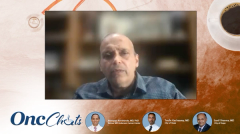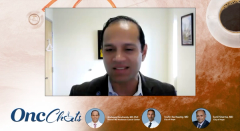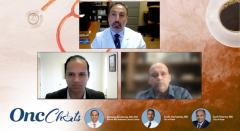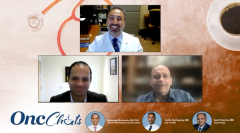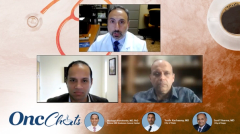
Leveraging Immunotherapy in GI Malignancies: Looking to the Future
In this episode of OncChats: Leveraging Immunotherapy in GI Malignancies, experts discuss next steps for research, including vaccination strategies, personalized cellular therapies, and more.
Episodes in this series

In this last episode of OncChats: Leveraging Immunotherapy in GI Malignancies, Toufic Kachaamy, MD, of City of Hope, Sunil Sharma, MD, of City of Hope, and Madappa Kundranda, MD, PhD, of Banner MD Anderson Cancer Center, discuss next steps for research, including vaccination strategies, personalized cellular therapies, and more.
Kundranda: All of this is certainly exciting. All of us want to move the needle forward. To kind of wrap this conversation, if you had a crystal ball and you were to look into the future, [when it comes to] trying to intervene earlier on, trying to change the stage shifting, and hoping to improve survival, what do you see is the biggest challenge from a drug or therapy development standpoint? Dr Sharma?
Sharma: Heterogeneity is a big challenge. Basically, a lot of the genomic therapies are predicated on specific alterations, [and we] will develop drugs for them. If you look at the evolution of the genomics in any solid tumor, specifically gastrointestinal malignancies, what happens is there are some truncal mutations, and then they branch off into many different kinds of mutation profiling, for instance. So, the question is, [for] which of these can you really intervene? We can talk another time about whether approaching drugs at these truncal mutations that are common to all the tumors is a good, personalized medicine approach; those have been generally not targetable in the past, but we’ve made significant advances in targeting them. That’s one side of things.
The other part of it is—and I’m super excited [about this], we’ve done some work and other people are working on this—the development of very potent vaccination strategies. Tumor vaccines have not been very successful in the past, but that’s been because specific hypotheses haven’t quite panned out. When I was a fellow, a long time ago, people were trying to develop a CEA vaccine, but that usually meant that you had chosen CEA as the enemy to kill, so to speak. For a variety of reasons, that didn’t work, but one of the main reasons is heterogeneity. Number one, what is the real role of CEA on the surface in tumor biology? That’s unknown. Number two, heterogeneity; a lot of cells may not have that. So now, we have much more sophisticated approaches in figuring out what kind of vaccines to develop, and how we can do what I call personalized vaccines or personalized cellular therapies. Those [approaches] are going into the clinic imminently, in the next few months. We can maybe talk about those another time, but [that’s something that] we could bring to bear in addition to the immune therapies, for instance, which we discussed are having a nice effect.
These are all technologies that have come out of genomic characterizations, and early understanding of tumor evolution, which is another thing that we have made significant advances with. So, certainly, those are the things that are going to lead to more advances in this field. Once we have personalized vaccines, then that would be the area where we could really change the trajectory, hopefully, from the Kaplan-Meier curve all going down directly into the toilet, to having possibly a tail on the curve, so to speak, where, we would have patients who would potentially get interventions that we still do, like chemotherapies, early interventions, but then stabilized, or get a much more robust kill rate using either these kinds of immune strategies or personalized medicines that actually attack more common mutations that have been previously considered undruggable.
Kachaamy: Wow, thanks for sharing your optimism.
Sharma: Thank you. I’m an oncologist. You have to be optimistic.
Kachaamy: Thank you for sharing your expertise with us today; this was fantastic. We value your time and your knowledge.
Sharma: Thank you so much, Toufic and Madappa, for inviting me. I appreciate it.
Kundranda: Thank you.


